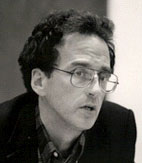By Michael Khoo
June 28, 1999
Organizers of a petition drive in St. Paul say they have more than twice as many
signatures as necessary to put a new ballpark-funding question on the ballot
this fall. But many questions still surround the subject, including the
finances of Major League Baseball and the viability of small-market teams like
the Minnesota Twins. Mayor Norm Coleman, who is spearheading the stadium push in
St. Paul, says without some reform in professional baseball, building a ballpark
doesn't make sense.
 |
 |
 |
Andrew Zimbalist.
Hear the 12/6/95 edition of NPR's Talk of the Nation featuring Andrew Zimbalist on the baseball economy.
|
|
 |
|
|
PLACING AN ITEM ON THE ST. PAUL BALLOT
this November requires roughly
5,000 signatures. In less than two weeks, stadium proponents have gathered
more than 10,000. Larry Dowell is the president of the St. Paul Area
Chamber of Commerce, the group funding the petition drive.
Dowell
: The plan was always that we would have sufficient numbers of signatures
so that it goes on the ballot without any question. So I think there's a
confidence level that we're in good shape.
It seems certain Mayor Coleman's proposal will at least appear on the
ballot. The plan calls for the city, the state, and the Twins to split the costs
of a new ballpark in thirds, each paying approximately $100 million. St. Paul's
share would be raised with a half-percentage point city-wide sales tax increase.
Opponents of the proposal argue public subsidies for a baseball stadium amount
to corporate welfare - raising taxes to enrich Twins owner Carl Pohlad.
Supporters say a downtown ballpark would spark economic activity and revitalize
the urban core. But what everyone seems to agree on is that the finances of
Major League Baseball are in disarray.
 |
 |
|
It's Your Turn
|
Put your opinion on the record in the MPR Forum.
See Poll results of recent MPR Online poll.
Michael Khoo covers the stadium debate in St. Paul for Minnesota Public Radio. To provide feedback on this story,
please email him at mkhoo@mpr.org.
|
|
 |
|
|
Andrew Zimbalist is an economist at Smith
College in Massachusetts. He says small markets such as the Twin Cities simply
cannot generate the same revenue as their bigger rivals such as New York or Los
Angeles. As a result, the Twins will remain at a competitive disadvantage.
Zimbalist:
If there is a new stadium in a city like Minneapolis or St. Paul,
probably the team can raise its net revenues somewhere on the order of
$20 million. And that can make a dent in the disparities, but the disparities
between the top teams and the bottom teams right now are probably somewhere on
the order of $120 or $130 million. So whereas they can make a dent, they
can't undo those disparities.
Zimbalist says the problem has grown to the point now that Major
League Baseball is on the verge of being dysfunctional. Mayor Coleman has
acknowledged small market teams face significant financial obstacles, and he
has pledged to lobby baseball commissioner Bud Selig for reforms. Without some
assurance of change, Coleman says there is no point in laying the first brick in
a new stadium. But mayoral aide Eric Mische says Coleman has no concrete
plan so far.
Mische
:
They have to make those changes, whatever those changes may be; it may
be revenue sharing, it maybe some change in collective bargaining, we don't
know what specifically what those are, but there has to be a commitment to
recognize the problems of survivability of the small-market teams. But at the
end of the day, if all of the work has been done here, Major League Baseball
isn't committed to reforming itself, then it makes it very difficult to justify
why we should move forward.
Professor Zimbalist says because baseball enjoys monopoly power, it
is unlikely a single community or state can force any significant change in the
league.
Zimbalist
:
Pennsylvania citizens might try to align with Minnesota citizens. And
maybe they can also find some support in Connecticut these days. But in the end,
they're just going to find four or five states and local areas to support
something like this. And professional sports leagues have many lobbying efforts
and many levers to pull to influence the way senators and members of congress
vote on these things.
U.S. Senator Arlen Specter of Pennsylvania is currently pushing
legislation that would require Major League Baseball and the National Football League to contribute
at least 50 percent to new stadium construction or renovation. But Zimbalist
gives that effort no chance of success.

